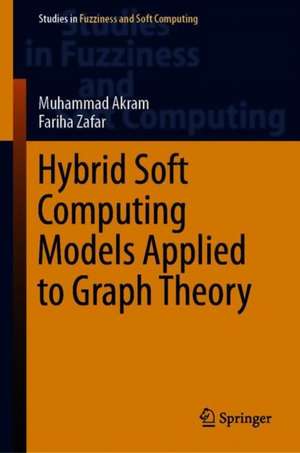Hybrid Soft Computing Models Applied to Graph Theory: Studies in Fuzziness and Soft Computing, cartea 380
Autor Muhammad Akram, Fariha Zafaren Limba Engleză Hardback – 16 apr 2019
Din seria Studies in Fuzziness and Soft Computing
- 20%
 Preț: 999.85 lei
Preț: 999.85 lei - 20%
 Preț: 653.06 lei
Preț: 653.06 lei - 20%
 Preț: 872.98 lei
Preț: 872.98 lei - 20%
 Preț: 930.57 lei
Preț: 930.57 lei - 20%
 Preț: 1051.00 lei
Preț: 1051.00 lei - 20%
 Preț: 992.44 lei
Preț: 992.44 lei - 20%
 Preț: 655.85 lei
Preț: 655.85 lei - 20%
 Preț: 1001.86 lei
Preț: 1001.86 lei - 18%
 Preț: 954.14 lei
Preț: 954.14 lei - 20%
 Preț: 330.10 lei
Preț: 330.10 lei - 20%
 Preț: 333.04 lei
Preț: 333.04 lei - 20%
 Preț: 997.56 lei
Preț: 997.56 lei -
 Preț: 391.61 lei
Preț: 391.61 lei - 20%
 Preț: 647.79 lei
Preț: 647.79 lei - 20%
 Preț: 986.01 lei
Preț: 986.01 lei - 18%
 Preț: 958.56 lei
Preț: 958.56 lei - 20%
 Preț: 996.40 lei
Preț: 996.40 lei - 20%
 Preț: 999.35 lei
Preț: 999.35 lei - 15%
 Preț: 646.43 lei
Preț: 646.43 lei - 20%
 Preț: 651.57 lei
Preț: 651.57 lei - 20%
 Preț: 997.89 lei
Preț: 997.89 lei - 15%
 Preț: 641.03 lei
Preț: 641.03 lei - 20%
 Preț: 1009.74 lei
Preț: 1009.74 lei - 20%
 Preț: 992.62 lei
Preț: 992.62 lei -
 Preț: 388.72 lei
Preț: 388.72 lei - 18%
 Preț: 1223.43 lei
Preț: 1223.43 lei - 20%
 Preț: 651.42 lei
Preț: 651.42 lei - 18%
 Preț: 951.59 lei
Preț: 951.59 lei - 18%
 Preț: 948.61 lei
Preț: 948.61 lei
Preț: 944.77 lei
Preț vechi: 1180.96 lei
-20% Nou
Puncte Express: 1417
Preț estimativ în valută:
180.84€ • 196.50$ • 152.00£
180.84€ • 196.50$ • 152.00£
Carte tipărită la comandă
Livrare economică 21 aprilie-05 mai
Preluare comenzi: 021 569.72.76
Specificații
ISBN-13: 9783030160197
ISBN-10: 303016019X
Pagini: 440
Ilustrații: XXV, 434 p. 279 illus., 1 illus. in color.
Dimensiuni: 155 x 235 mm
Greutate: 0.82 kg
Ediția:1st ed. 2020
Editura: Springer International Publishing
Colecția Springer
Seria Studies in Fuzziness and Soft Computing
Locul publicării:Cham, Switzerland
ISBN-10: 303016019X
Pagini: 440
Ilustrații: XXV, 434 p. 279 illus., 1 illus. in color.
Dimensiuni: 155 x 235 mm
Greutate: 0.82 kg
Ediția:1st ed. 2020
Editura: Springer International Publishing
Colecția Springer
Seria Studies in Fuzziness and Soft Computing
Locul publicării:Cham, Switzerland
Cuprins
Rough Fuzzy Graphs.- Fuzzy Rough Graphs.- Intuitionistic Fuzzy Rough Graphs.- Fuzzy Soft Graphs.- Intuitionistic Fuzzy Soft Graphs.- Soft Rough Fuzzy Graphs.- Bipolar Fuzzy Soft Graphs.- Soft Rough Neutrosophic Influence Graphs.
Notă biografică
Dr. Muhammad Akram received MSc degrees in Mathematics and Computer Science, MPhil in Computational Mathematics and PhD in Fuzzy Mathematics. He is currently a Professor in the Department of Mathematics at the University of the Punjab, Lahore, Pakistan, where he has been serving as a PhD supervisor of more than 10 students. Dr. Akram’s research interests include numerical solutions of parabolic PDEs, fuzzy graphs, fuzzy algebras, and fuzzy decision support systems. He has published 7 monographs and 300 research articles in international peer-reviewed journals. He has served as editorial board member of 10 international academic journals and as reviewer of 122 International journals, including Mathematical Reviews and Zentralblatt MATH.
Dr. Fariha Zafar received her PhD degree in Mathematics and MPhil degree in Mathematics from the University of the Punjab, Lahore. She has introduced the notions of Soft Trees and Fuzzy Soft Trees during her MPhil research work. She has published 10 research articles in top-ranked international journals. Her research interests include fuzzy graphs, soft set theory, rough set theory and decision-making.
Textul de pe ultima copertă
This book describes a set of hybrid fuzzy models showing how to use them to deal with incomplete and/or vague information in different kind of decision-making problems. Based on the authors’ research, it offers a concise introduction to important models, ranging from rough fuzzy digraphs and intuitionistic fuzzy rough models to bipolar fuzzy soft graphs and neutrosophic graphs, explaining how to construct them. For each method, applications to different multi-attribute, multi-criteria decision-making problems, are presented and discussed. The book, which addresses computer scientists, mathematicians, and social scientists, is intended as concise yet complete guide to basic tools for constructing hybrid intelligent models for dealing with some interesting real-world problems. It is also expected to stimulate readers’ creativity thus offering a source of inspiration for future research.
Caracteristici
Explains how construct and use rough fuzzy digraphs Describes applications to different sets of data and complex problems Describes relevant extensions, such as soft rough neutrosophic graphs
